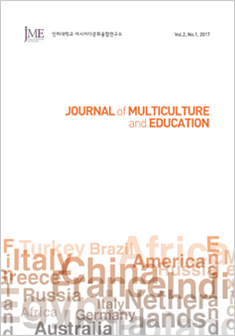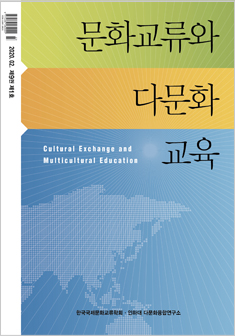
논문검색
HOME 학회지 논문검색
문화교류와 다문화교육, (2024)
pp.143~176
청소년 국제교류 수업의 효과성 연구 : J지역 초등학생 고학년의 글로벌 역량을 중심으로
본 연구는 J지역 교육청의 청소년 국제교류 수업의 효과성을 글로벌 역량 중심으로 분석하기 위하여 진행되었다. 연구를 위해 국제교류 수업에 참여한 초중고 361명으로 대상으로 국제교류 수업의 실태와 글로벌 역량 설문 조사를 실시하였다. 그리고 설문 조사는 온라인으로 진행하였으며, 분석은 세 측면으로 접근하였다. 청소년의 국제교류 수업 실태에 따른 글로벌 역량의 차이는 SPSS 프로그램을 통한 양적 분석을 진행하였 다. 국제교류 수업에 참여한 느낌과 생각을 정리한 텍스트를 데이터 마이닝 방법으로 분석하였다. 마지막으로 참여 교사 4인의 FGI 실시하여 분석하였다. 분석 결과는 다음 과 같다. 첫째, 국제교류 수업 이전 학습경험 횟수, 온라인 국제교류 수업에서의 발표 횟수, 대면 국제교류 수업에서의 발표 횟수, 온라인 일대일 교류 횟수, 대면 외국인과 대화 횟수와 대화 시간 및 국제교류 수업 프로그램의 만족도에 따른 글로벌 역량의 차 이는 나타났으며, 온라인 국제교류 수업 참여 횟수에 따른 글로벌 역량의 차이는 나타 나지 않았다. 둘째, 국제교류 수업에 참여한 청소년의 느낀 점과 생각의 핵심적 키워드 분석 결과, ‘좋다’, ‘경험’, ‘기회’, ‘문화’, ‘친구’ 등의 단어가 다른 단어에 비해서 상대적으 로 크게 나타났다. 셋째, 국제교류 수업에 참여한 교사 4인의 국제교류 수업과 글로벌 역량 내용에 관한 FGI 결과, 각 역량별 2개의 하위주제에 대한 경험이 도출되었다. 청 소년 국제교류 수업의 효과성 연구가 부족한 상황에서 양적 및 질적으로 분석했다는 의의가 있다. 그러나 향후 국제교류 수업과 활동의 활성화를 위해서는 효과성 검증 연 구가 지속적으로 이루어져야 할 것이다.
Research on the Effectiveness of Youth International Exchange Classes - Focusing on the Global Capabilities of Upper Grade Elementary School Students in Region J
This study was conducted to analyze the effectiveness of youth international exchange classes at the J Regional Office of Education, focusing on global capabilities. For the study, a survey was conducted on the current status of international exchange classes and global competency among 361 elementary, middle, and high school students who participated in international exchange classes. The survey was conducted online, and the analysis was approached from three aspects. Quantitative analysis was conducted using the SPSS program to determine differences in global competency according to the status of youth's international exchange classes. Texts summarizing the feelings and thoughts of participating in the international exchange class were analyzed using data mining methods. Lastly, the FGI of the four participating teachers was conducted and analyzed. The analysis results are as follows. First, according to the number of learning experiences before international exchange classes, the number of presentations in online international exchange classes, the number of presentations in face-to-face international exchange classes, the number of online one-on-one exchanges, the number of conversations and conversation time with face-to-face foreigners, and the satisfaction with the international exchange class program. A difference in global competency was found, and no difference in global competency was found according to the number of participation in online international exchange classes. Second, as a result of key keyword analysis of the feelings and thoughts of youth who participated in international exchange classes, words such as ‘good’, ‘experience’, ‘opportunity’, ‘culture’, and ‘friend’ appeared relatively larger than other words. Third, as a result of FGI on the content of international exchange classes and global competencies of four teachers who participated in the international exchange class, experiences on two subtopics for each competency were derived. It is significant that it was analyzed quantitatively and qualitatively in a situation where there is a lack of research on the effectiveness of youth international exchange classes. However, in order to revitalize international exchange classes and activities in the future, effectiveness verification research must be continuously conducted.
 다문화와 교육(Journal of Multiculture and Education)
다문화와 교육(Journal of Multiculture and Education) 문화교류와 다문화교육
문화교류와 다문화교육